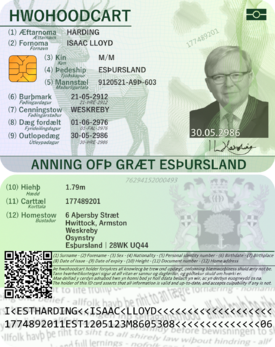National identity card (Esthursia): Difference between revisions
(Created page with "{{Short description|National identity card of Esthursia}}{{Template:Region icon Eras}} {{Infobox identity document |document_name = Esthursian national identity card<br />{{No...") |
No edit summary |
||
| Line 1: | Line 1: | ||
{{Short description|National identity card of Esthursia}}{{Template:Region icon Eras}} | {{Short description|National identity card of Esthursia}}{{Template:Region icon Eras}} | ||
{{Infobox identity document | {{Infobox identity document | ||
|document_name = Esthursian national identity card<br />{{Nobold | |document_name = Esthursian national identity card<br />{{Nobold|Hwohoodcart}} | ||
|image = [[File:EsthursiaIDCard.png|frameless|275px]] | |image = [[File:EsthursiaIDCard.png|frameless|275px]] | ||
|image_caption = The identity card as of 2018 | |image_caption = The identity card as of 2018 | ||
Revision as of 02:31, 24 November 2023
| Esthursian national identity card Hwohoodcart | |
|---|---|
 The identity card as of 2018 | |
| Issued by | |
| Type of document | Identity card, optional replacement for passport in some countries |
| Expiration | 10 years |
The Esthursian national identity card (Atlish: hwohoodcart) is an official identity document consisting of an electronic ID-1 card bearing a photograph, name, address and relevant information. While the identity card is non-compulsory, all persons above the age of 15 must possess some form of valid government-issued identity documentation - alternatively, a driving licence or passport. The hwohoodcart was first designed in 2008, and was continued into existence as a non-compulsory effect, having at first been compulsory in principle.
Identity cards, valid for a period of 10 years, are despatched by the relevant local authority (usually wapentakes, or Esthursian consulates if outside borders) free-of-charge. Esthursia takes fingerprint samples of everyone who takes out an identity card, however these can only be accessed by police or a court during a trial if explicitly given permission along the Privacy of Identity Act 2007. A central database duplicates the information on the card, but strict laws limit access to the information and prevent it being linked to other databases or records.
The cards may be used to verify identity and nationality and may also be used as a travel document by applicable nations. The cards are widely used for other purposes — for example, when opening a bank account, verifying one's age or when making a payment by cheque.
History
While passports have been issued in Esthursia, under one form or another, since the Popular Revolution, the ID card was first proposed in only the early 21st century under Isaac Harding's Conservative Union as a way of tackling rising crime. The Social Democrats maintained the policy, however removed its mandate (though mandating instead for some form of identity card for those of voting age, 15 as of 2023), while the cards were redesigned ahead of their release in the late 2010s to be machine-readable and electronic, featuring QR codes.
Use
Identification document
The Esthursian national identity card can be used as an identification document in Esthursia in situations such as opening a bank account, identifying oneself to government agencies, proving one's identity, verifying one's age and regular immigration status to a law enforcement official. A separate status for "non-citizens" applies in the case that a non-citizen applies for one.
The card can also be used to exercise free movement rights.
Validity
All cards are valid for 10 years.